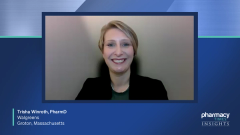
Final Thoughts on Shingles Management
An expert emphasizes the importance of prompt antiviral treatment and personalized pain management for shingles—particularly in high-risk patients—while highlighting the pharmacist’s role in guiding appropriate over-the-counter care, promoting vaccination through timely conversations, and leveraging tools like immunization registries and word of mouth to improve prevention efforts.
Episodes in this series

Timely treatment is critical for shingles, especially in high-risk patients. As soon as a rash appears, patients should see a provider to begin antiviral therapy—typically acyclovir or valacyclovir—to shorten the illness’s duration. Though these medications don’t cure shingles, they help reduce symptom severity. Pain management is also essential and can include over-the-counter options like acetaminophen, ibuprofen, or naproxen, but must be tailored to each patient’s existing medications and health conditions. Topical agents such as lidocaine, aloe, and capsaicin can also ease discomfort, while cool compresses, oatmeal baths, and calamine lotion offer additional relief.
For more severe pain or cases that develop into postherpetic neuralgia (PHN), treatment may escalate to include tricyclic antidepressants, gabapentin, pregabalin, or corticosteroids. Opioids are sometimes prescribed but are generally not supported by evidence and pose risks—especially in older adults with comorbidities like diabetes, heart disease, or kidney impairment. Because PHN can last weeks to months, individualized care and monitoring for drug interactions is crucial. Clinicians should also emphasize lifestyle-based self-care—rest, nutrition, and mental well-being—to support recovery. Personalized recommendations, including walking patients to specific products in the pharmacy, help avoid inappropriate OTC choices that could worsen open sores or fail to address nerve-related pain.
Looking ahead, shingles vaccination continues to gain traction, particularly when recommended around a patient’s 50th birthday. Pharmacists play a key role in normalizing this vaccine through routine interactions, like flu shot visits or medication pickups. Operational challenges, such as the current need to reconstitute the vaccine, may improve with the anticipated release of a prefilled syringe. State immunization registries also help pharmacies track vaccine status and coordinate future doses. Encouragingly, patient word of mouth drives vaccine uptake—when one person shares a positive experience, others often follow. Ongoing education and consistent conversations remain vital to increasing acceptance and protecting more patients from shingles.
Newsletter
Stay informed on drug updates, treatment guidelines, and pharmacy practice trends—subscribe to Pharmacy Times for weekly clinical insights.
























